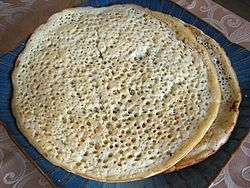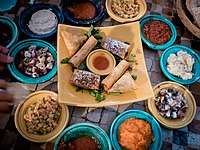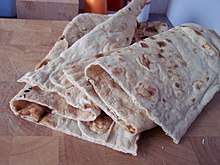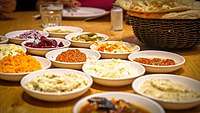Lahoh
Lahoh, also Luḥūḥ (Arabic: لحوح, Somali: Laxoox, Hebrew: לחוח), is a spongy, pancake-like bread originated from Yemen, Somalia and Djibouti.[1][2]
 | |
| Alternative names | Laxoox, Canjeero, Canjeelo, griddle-cake |
|---|---|
| Type | Flatbread |
| Place of origin | Yemen, Somalia, Djibouti |
| Main ingredients | Plain flour, self-raising flour, water, yeast, salt |
 |
| Part of a series on |
| Arab cuisine |
|---|
|
Regional cuisines
|
|
Salads
|
|
Holidays and festivals
|
|
Preparation
Lahoh is prepared from a dough of plain flour, self-raising flour, warm water, yeast, and a pinch of salt. The mixture is beaten by hand until soft and creamy .[3] Sorghum is the preferred flour for making lahoh. There is a sweet-tasting variety of the dish, as well as another variety that is made with eggs.[2]
Lahoh is traditionally baked on a metallic circular stove called a taawa. Lacking that, it can also be baked in an ordinary pan.
Regional consumption
In Yemen, it is often sold on the street by peddlers.[4] It also can be found in Israel, where it was introduced by Yemenite Jews who immigrated there.[5] In Somalia, lahoh is eaten with curry, soup, or stew.[2]
See also
References
- Little Business Women Archived 2011-09-28 at Archive.today
- Mohamed Diriye Abdullahi, Culture and Customs of Somalia, (Greenwood Press: 2001), p. 113.
- Preparing Lahoh
- Dholas and other straw hats come into season Archived 2012-03-08 at Archive.today
- Hatikva market — the other side of Tel Aviv Archived 2015-04-27 at the Wayback Machine

